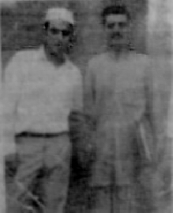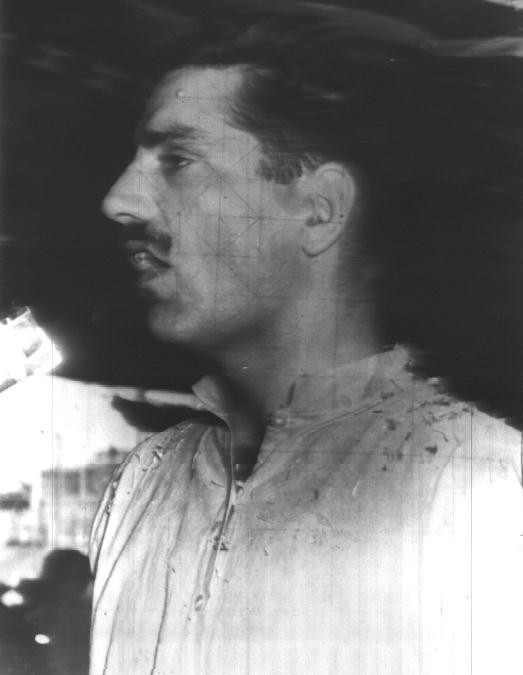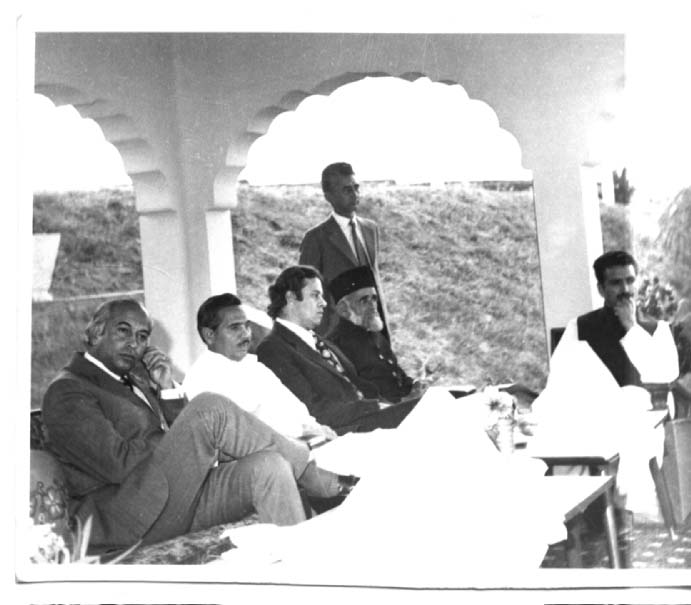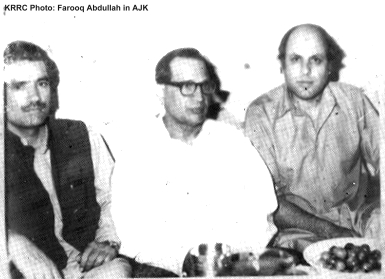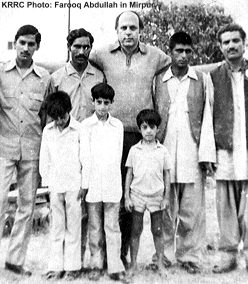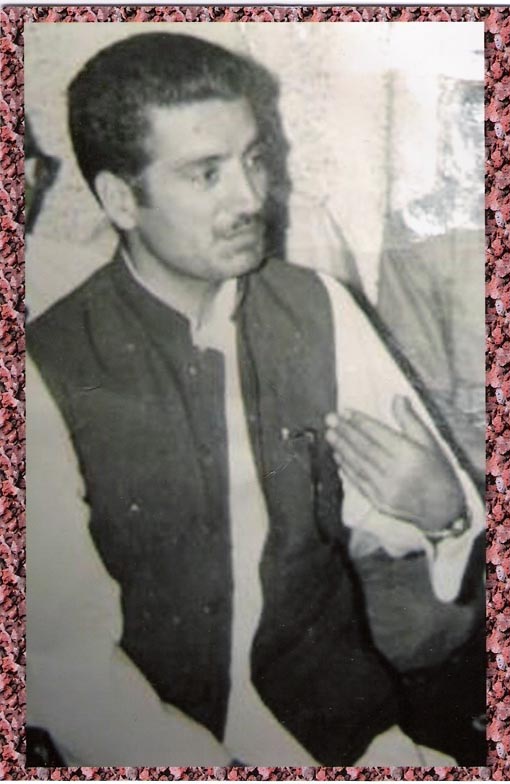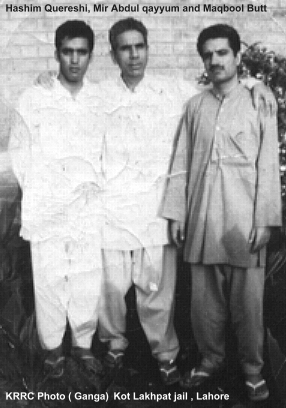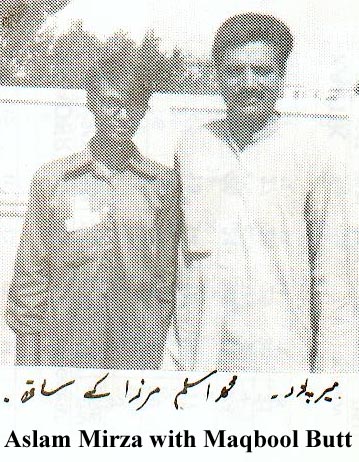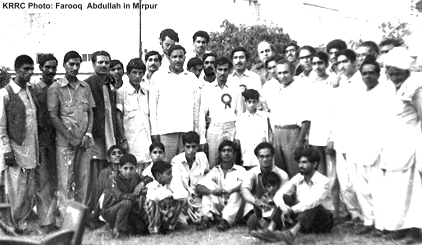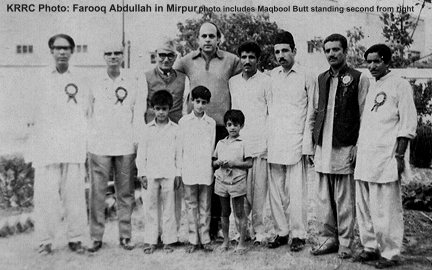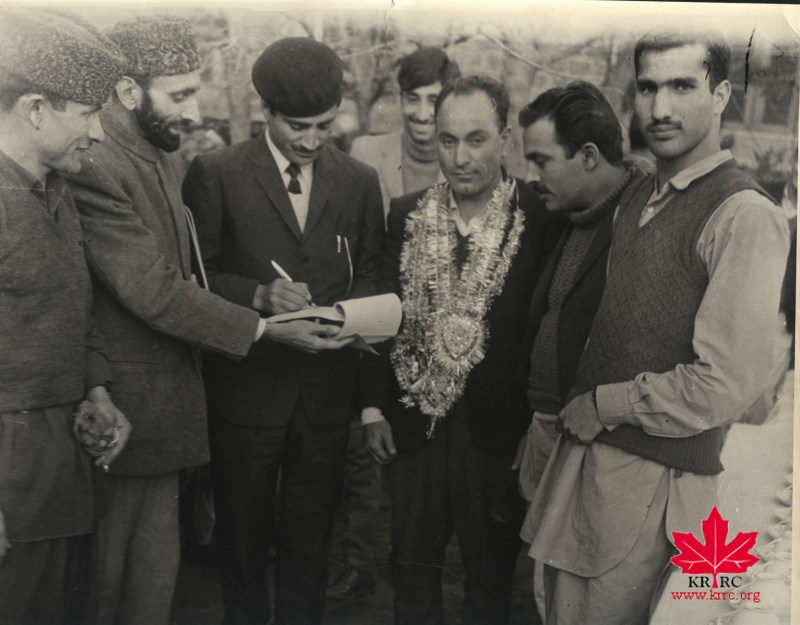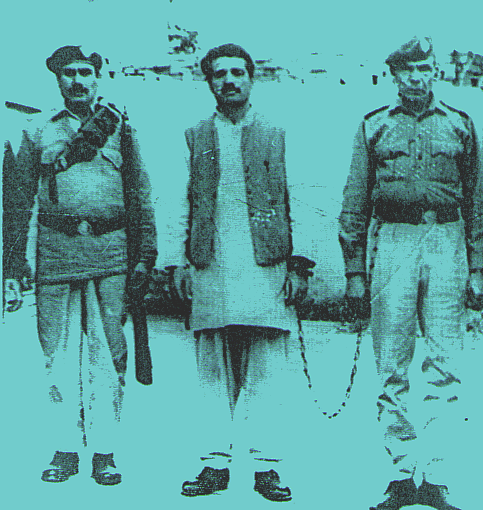As relevant, perhaps more
On his 20th death anniversary, the story of Maqbool Butt -- who inspired a whole generation of Kashmiri youth -- retold
By Arif Jamal
Maqbool Butt died 20 years ago, on February 11, 1985, but he still remains an icon of armed struggle and independence for Jammu and Kashmir. He became larger than life in death and inspired a whole generation of Kashmiri youth who rose against the Indian state chanting 'azaadi' within a few years after he was hanged by the Indian government. Many in Jammu and Kashmir believe he inspires more people today than he had done at any other time in the past.
Maqbool Butt's struggle cannot be separated from the armed freedom movement in Jammu and Kashmir. It started when he, along with Abdul Khaliq Ansari and Amanullah Khan, founded the Plebiscite Front (for Azad Kashmir and Pakistan) in April 1965 at a convention in Sialkot. As soon as the convention was over, the participants boarded the buses and went to the India-Pakistan working boundary and at Socheet Garh, only 20 kilometres from the city of Jammu. One of them crossed the unguarded no man's land and brought back some earth from the Indian Jammu and Kashmir. With earth from the 'Occupied' Kashmir in their hands, they took oath of sacrificing everything including their lives for the sake of the liberation of Jammu and Kashmir.
 The Plebiscite Front for Azad Kashmir and Pakistan (not to be confused with the Plebiscite Front in India-controlled Jammu and Kashmir) was not a homogenous group. A large majority of its office-bearers supported peaceful struggle while a smaller group, led by Amannullah Khan and Maqbool Butt, wanted to start an armed freedom struggle to achieve azaadi. Discouraged by the majority group, Amanullah Khan and Maqbool Butt decided to form an underground militant group to start armed struggle. At a meeting in Peshawar in August 1965, they named their group National Liberation Front (NLF), under the leadership of Amanullah Khan and Maqbool Butt. All the members of the NLF were required to sign an oath in their own blood that they would not hesitate to sacrifice even their lives to achieve the NLF objectives. The group continued to grow, slowly but surely.
The Plebiscite Front for Azad Kashmir and Pakistan (not to be confused with the Plebiscite Front in India-controlled Jammu and Kashmir) was not a homogenous group. A large majority of its office-bearers supported peaceful struggle while a smaller group, led by Amannullah Khan and Maqbool Butt, wanted to start an armed freedom struggle to achieve azaadi. Discouraged by the majority group, Amanullah Khan and Maqbool Butt decided to form an underground militant group to start armed struggle. At a meeting in Peshawar in August 1965, they named their group National Liberation Front (NLF), under the leadership of Amanullah Khan and Maqbool Butt. All the members of the NLF were required to sign an oath in their own blood that they would not hesitate to sacrifice even their lives to achieve the NLF objectives. The group continued to grow, slowly but surely.
The NLF sent two groups to Indian Jammu and Kashmir in June 1966. One group headed by Maqbool Butt, was to recruit Kashmiri youth and the other group, headed by Major (Retired) Amannullah (not to be confused with Amannullah Khan), was to give them military training to start armed struggle. Maqbool Butt's group worked hard to set up underground cells in the Valley of Kashmir for the next three months. However, the Indian intelligence and security agencies came to know of their presence and tried to arrest them. The group succeeded in taking Indian Inspector Amarchand hostage.
While in their custody, Inspector Amarchand tried to escape but Aurangzeb, one of the members of the group, pursued and killed him. Later, the Indian security agencies zeroed in on the house where the group had taken refuge and succeeded in killing two members of the group including Aurangzeb. The Indian security agencies registered cases against Maqbool Butt and others for inciting the people against the Indian state and killing Inspector Amarchand.
When the two groups returned to Pakistan, the Pakistani security agencies arrested them. The arrest of Maqbool Butt and the revelation of the existence of the NLF clearly divided the Plebiscite Front in two groups, headed by Amannullah Khan and Mir Abdul Aziz respectively. Although the majority of the members sided with the Mir Abdul Aziz group, the Plebiscite Front had to adopt the ideology of armed struggle as one of the objectives of the Plebiscite Front under the pressure from the other group. It appears that the Amannullah's group was becoming stronger while the opposition to armed struggle was dying.
In the same year, a court in the Indian Jammu and Kashmir sentenced Maqbool Butt and Mir Ahmed to death for killing inspector Amrchand and Subedar (retired) Kala Khan to life imprisonment. Maqbool Butt, Mir Ahmed and Chaudhary Yasin, who was imprisoned in the Srinagar Central Jail since 1966, broke the jail in December 1966 and reached Pakistan after walking through snow-clad mountains fro 16 days. They were arrested on reaching Azad Kashmir. However, the government had to release them in March 1969 under the rising pressure from the Plebiscite Front.
The jailbreak by Maqbool Butt and his comrades instantly turned them into heroes in the eyes of a large number of Kashmiri youth. Consequently, the Plebiscite Front finally abandoned its opposition to the NLF and adopted the concept of the armed struggle at a party convention in November 1969. The convention also elected Maqbool Butt the president of the Plebiscite Front. Maqbool Butt declared the NLF the armed wing of the Plebiscite Front. The Plebiscite Front sponsored a series of bomb explosions against particularly the military targets in Jammu to draw the attention of the world community to the Kashmir conflict.
The Plebiscite Front leaders felt frustrated when they realised that their militant activities had failed to attract international attention to the Kashmir conflict. They started looking for other tactics. It so happened that Hashim Qureshi came to Peshawar to attend the wedding ceremony of his sister, where he happened to meet some NLF leaders including Maqbool Butt. On learning about the NLF, Hashim Qureshi expressed his desire to join the group. Maqbool Butt appointed Hashim Qureshi as the head of the NLF in Indian Jammu and Kashmir. Hijacking airplanes was becoming fashionable as a political weapon after Palestinian and Eritrean freedom fighters hijacked airplanes, which attracted considerable international attention. They decided to highjack an Indian airplane for this purpose. Maqbool Butt asked Hashim Qureshi to plan the hijacking of an Indian airplane to which he agreed.
Finally, Ashraf Qureshi and Hashim Qureshi succeeded in hijacking Indian airplane Ganga with a toy pistol and a toy hand grenade in January 1971 and brought it to the Lahore airport. The hijacking caught the General Yahya Khan regime unawares. The Pakistani security agencies manipulated Ashraf Qureshi and Hashim Qureshi into releasing all the passengers against their will.
The hijacking of Ganga instantly turned Maqbool Butt, Hashim Qureshi and Ashraf Qureshi into national heroes, particularly in Punjab and Azad Kashmir. Chairman PPP Zulfikar Ali Bhutto came to congratulate the hijackers and asked them not to return the airplane to India. Tens of thousands of people descended in the streets of Punjab and showered rose petals on the NLF leaders. The PPP workers particularly participated in those processions. However, Mujeebur Rehman appeared to believe that General Yahya Khan had hatched a conspiracy to find an excuse to delay transfer of power to his Awami League.
As the relations between Pakistan and India started deteriorating and war clouds appeared on the horizon, the Yahya Khan regime decided to try the hijackers. A one-member investigation commission, headed by Justice Noorul Arifeen declared the hijacking an Indian conspiracy. Later, instead of trying them in an ordinary court, the government constituted a special tribunal consisting of Justice Yaqub Ali Khan of the Supreme Court and Justice Abdul Qadir Shaikh of the Sindh High Court to try the six NLF leaders. The tribunal acquitted Ashraf Qureshi but sentenced Hashim Qureshi to 14 years in jail in its verdict announced in May 1973. The NLF immediately appealed against this verdict. But, the Supreme Court acquitted Hashim Qureshi in 1980, nine years after he was arrested. Hashim Qureshi, if not others, had become completely disillusioned with Pakistan. Maqbool Butt and some other NLF leaders again went to Indian Jammu and Kashmir to recruit young Kashmiri and set up underground cells. As the NLF was always short of money, Maqbool Butt thought of robbing an Indian bank in a village while he was returning to Azad Kashmir. In the shootout that followed, the bank manager got killed and Maqbool Butt and his comrades escaped from the scene.
The Indian security agencies succeeded in arresting him before he could cross into Azad Kashmir. The Indian Supreme Court restored the death sentence against him in 1978. The Indian government carried out the sentence in 1984 when it sensed that Maqbool Butt and his ideology were becoming popular among the Kashmiri Muslims. Maqbool Butt achieved in death what he could not achieve in life; an armed struggle against the Indian occupation, led by the JKLF, burst into a popular revolt in 1990.


